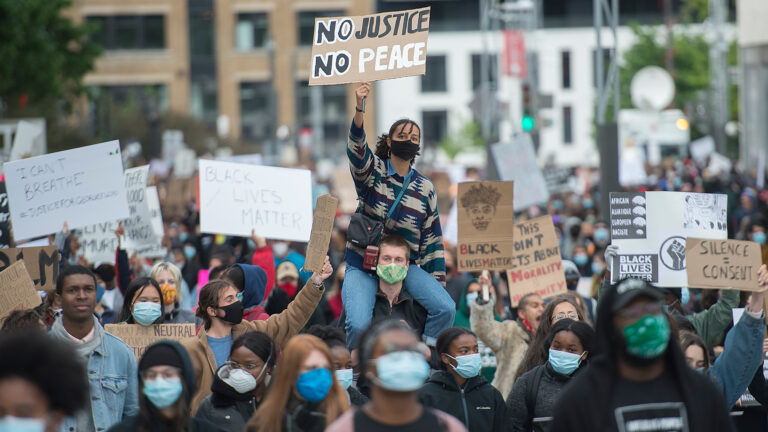The Government of Ontario is developing its next five-year Poverty Reduction Strategy. According to 2019 estimates, 1.57 million people in Ontario live in poverty, including 382,000 children. Child poverty in the province has grown in recent years – and this was before contending with the coronavirus.
By widening economic and social inequities, COVID-19 highlights the pressing need for sustained government intervention. While support by all levels of government has been generous and swift, many emergency relief measures remain temporary. Long-term solutions are urgently needed to counteract the harmful effects of the pandemic and ensure communities do not fall into deeper levels of poverty.
Women are more likely to face poverty than men as they constitute the majority of people employed in minimum wage and precarious jobs, they assume greater unpaid care work, and face a substantial wage gap. This is compounded for women who are Indigenous, Black, racialized, new to Canada, living with disabilities, elderly and LGBTQ2S+.
Forty percent of children in single-women-led households live in poverty, more than twice the poverty rate of two-parent families. Poverty also negatively impacts the ability of women to leave abusive relationships. Emergency services for women escaping violence were already stretched to capacity before the crisis began — we are now seeing a spike in demand as the crisis unfolds.
It is clear that the lack of progress on poverty has disproportionately harmed women and children. A robust strategy is needed – perhaps now more than ever before – to ensure the well-being and safety of already marginalized communities.
At YWCA Toronto, we recently conducted a series of consultations to prepare our Poverty Reduction Strategy submission. What we found in speaking to the communities we serve is a great deal of frustration and despair, as well as hope.
Some specific findings from our consultations:
Access to affordable, supportive and dignified housing options was identified as the number one need by the communities we serve. The lack of adequate and affordable housing is putting women and children in unsafe situations. Twenty-five percent of the National Housing Strategy funds should be invested in housing solutions that respond to the specific challenges women face – for example, those with children, those facing homelessness or precarious living arrangements, and those facing violence. Strong inclusionary zoning regulations that ensure at least 25 percent of every new condominium development is set aside for deeply affordable housing is another progressive way to increase the stock of available units. The women we spoke to offered many other potential policy solutions, captured in our report.
Our social assistance system is deepening poverty. The Ontario Works (OW) and the Ontario Disability Support Program (ODSP) do not meet basic needs. The women we spoke with wanted the government to know social assistance rates are too low and should increase. A single recipient of OW receives $733, which is supposed to cover both rent and living expenses. In the words of one participant, “Ontario Works is not enough. You can’t expect people to get their life together on $300.” Through the Canada Emergency Response Benefit, the federal government is recognizing that $2000 is needed, on average, to survive. It is time to substantially increase rates and transform the income security system. The previous government set up a task force to investigate income security reform. Implementing the findings of that taskforce is an evidenced-based approach to offering relief to some of Ontario’s most marginalized communities.
Needing “Canadian experience” traps newcomer women in minimum wage jobs and precarious work, limiting their opportunities to build a life in Canada. More opportunities for newcomers and social assistance recipients to access women-centred employment programs are needed. For example, while Ontario is experiencing a skilled trades shortage, investments to support women to enter the skilled trades and technology fields right now are relatively small, short-term and often on a year-by-year basis. Barriers to women’s participation in the skilled trades must be removed by substantially increasing investment and creating more flexible funding opportunities for women-led organizations that offer women-centred employment and skills training programs.
Unpaid care work is a source of gender-based poverty and oppression. We urge the government to invest in universal child care, supports for caregivers, and seriously explore a basic income program. Ontario’s basic income pilot project offered some wonderful findings, despite being cancelled prematurely in 2019. It is time for the provincial government to work with the federal government in developing a national guaranteed income program, or modify an existing income security program, that recompenses unpaid care work.
A Poverty Reduction Strategy that fails to address the specific concerns of diverse women will not succeed — gender-responsive investments are urgently needed. This will require the provincial government to begin collecting disaggregated data in evaluating poverty, which has not been done so far by any government.
What the coronavirus is teaching us that public investment in social programs cannot be cut back or shortchanged. It is imperative that we substantially increase investment in health care, housing, child care, income security, and other community programs that weave the fabric of our social safety net and constitute the health of our province.
The next Poverty Reduction Strategy can serve as a key policy instrument to combat social and economic disparities. A comprehensive strategy can serve as an effective tool of public health, social inclusion and gender equality. COVID-19 represents a transformative moment — we hope that the gravity of this unprecedented situation will propel the provincial government toward a robust and meaningful strategy that will safeguard the economic security of all Ontarians.
This article is part of the The Coronavirus Pandemic: Canada’s Response special feature.
Photo: Shutterstock.com, by siam.pukkato













